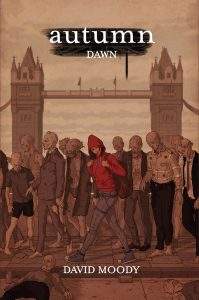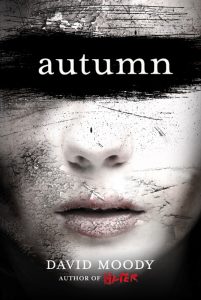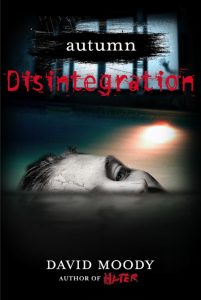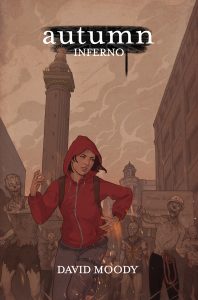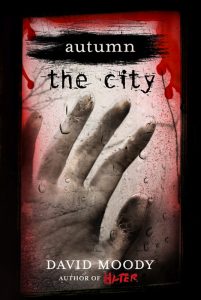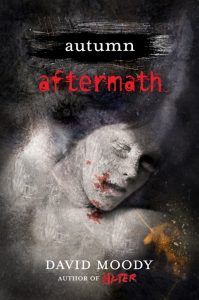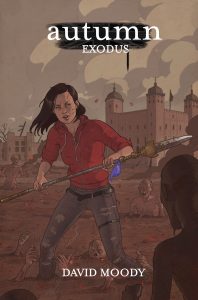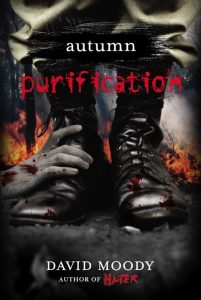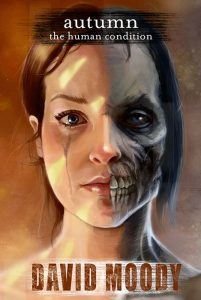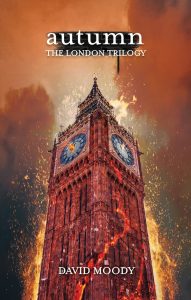Until Death Do Us Part
Note – the second part of this story contains MILD spoilers for AUTUMN: INFERNO.
It feels like I spent years sat here, waiting for yesterday to happen. I’d imagined the moment over and over, but when Barb finally died, I still didn’t know what to do. I mean, in a way she’d been dying slowly for years, and I’ve had plenty of time to get ready for it, but it still hit hard when she finally gave in and breathed her last. Janet – one of the support workers who has been helping me recently – she said I might feel better when it happened, I might even feel relieved. I don’t. Janet said to me that I shouldn’t feel guilty if I found myself thinking it was a good thing that Barb had gone. I didn’t think that was right, but I didn’t say anything at the time for fear of causing offence. Now it’s happened, though, I just feel numb. Empty inside.
Barbara and I met in Clacton, one rainy August afternoon, forty-six years ago last month. We had a long and (largely) happy marriage. We had our fair share of ups and downs – doesn’t every couple? – but there were many more ups, and only a handful of downs. We were both only children, and we both lost our fathers before we met. Our mothers died within six months of each other, and that was tough. We also had a bit of an ordeal when we found out we couldn’t have kids, but we accepted that in the end and made the most of everything else. Of course, the biggest down by a long chalk was when Barb got her diagnosis. That was three years ago now. Early onset, they called it. The two of us talked a lot back then about how we sometimes wished they hadn’t told us, because from the moment we knew about Barb’s dementia, nothing was ever the same again.
You used to see it on the TV news ever such a lot. There was often talk of research being done and trial treatments and so on, but I knew in my heart that my Barb would get nothing. We’re too far down the list, not important enough, not remarkable enough. I knew right from the beginning that it was just going to be me and her until the bitter end, and I was right. I called it.
It was everything else I got wrong.
The first year after her diagnosis wasn’t too bad, truth be told. In a strange way, things got a little easier for a time because we had an explanation as to why she was doing the things she did, a reason why she was stumbling on her words and forgetting things. We used to make a joke about it at first, but it soon stopped being funny when she started getting upset. Sometimes she got angry. She even hit me a couple of times, and bit me the once. I watched the love of my life slip away in front of my eyes and there wasn’t a bloody thing I could do. It was like all the things that made her who she was were fading away, like she was a picture that had been left out in the sun. Day by day, some of the changes were hard to see. It was the second Christmas when it really hit me. My cousin Martin would come to stay with every year (like us, Martin didn’t have any other immediate family). We used to make a point of always taking a photograph of the three of us, right before we ate dinner. A selfie, I suppose you’d call it. There was always the turkey on the table with all the trimmings, the tree in the corner of the flat, the fairy lights we used to drape around the balcony, and us with our silly paper hats on and Christmas jumpers. Same people, same place, same pose, year on year. But the difference that Christmas was remarkable. It proper upset me, it did, but I tried not to let Barb see. Me and Mart looked the same as we always did, but between us Barb looked like a shrunken shell of the woman I’d married. She was like a doll, could hardly hold her head up. She was fading fast. Back then, I didn’t think she’d last long into the new year, but she did.
Stubborn bugger.
She just wouldn’t let go.
I can’t say she fought the disease or anything as grand as that, but she clung on for as long as she could. Every morning I’d wake up thinking this would be the day. Each day felt like an eternity. I’d just sit in the chair next to her bed, watching and waiting, staring at her chest going up and down, convincing myself she’d stopped breathing, then holding my own breath until I was sure she hadn’t. I left the radio or the little television playing to start with, but after a while the noise seemed to bother her more than anything. I tried to make things as normal as I could, so instead I just kept speaking to her, talking about all the things we’d done together over the years. A couple of times she opened her eyes and looked at me, and I was sure that I could see my Barb still in there somewhere. Most of the time, though, I think I was just talking to myself.
She died at a quarter past eight in the evening, the first Monday in September. And when she finally passed, I realised I didn’t have anyone to tell.
I know now that I should have probably called the doctor or the hospice straightaway, but I didn’t want to, and I didn’t think Barb would have wanted that either. I wanted a little bit more time with her first. As I said, we’ve no family to speak of. Martin passed last March (he was quite a few years older than both of us), and since then, we’ve been very much alone. I decided I’d wait until the morning to let the authorities know what had happened. I wanted Barbara to have one last peaceful night at home in her own bed. It’s not much, but she and I always loved this little flat.
Of course, by the time I got around to phoning, it was too late. Because by then, everything had changed.
Don’t get me wrong, the NHS people did what they could for Barb, and I’m very grateful, but there are lots of things they don’t tell you when someone has dementia. Now, I don’t want this to come across like I’m feeling sorry for myself or like I think I deserved some kind of special treatment, and I feel selfish as anything even thinking it, but all the focus is on the person who’s ill, not the person who’s going to be looking after them. I’m not saying I wasn’t offered any support, but times are hard and money’s short, and there’s only so much that can be done.
All I’m saying is there’s an impact on the partner, on the carer, that rightly comes second place to everything else, but that carries a hefty price. It’s only sitting here now, looking back, that I can see just what the cost to me has been.
The more Barb deteriorated, the more care she needed, the less I had to do with the rest of the world. We had people coming in to see her, of course, and though we got on with them perfectly well, they weren’t friends, weren’t companions as such. I didn’t feel that I could talk to them like I wanted to. Don’t get me wrong, they were very kind, and they definitely cared for Barb, but at the end of the day it was just a job to them, and when they knocked off at the end of their shifts, they forgot about us up here in the high-rise and focused all their attentions on their own lives and families. And rightly so.
But what I didn’t appreciate was just how isolated I’d become.
Looking after my wife had been my sole focus for so long . . . I’d forgotten about everything else. I used to have hobbies and interests, programmes I’d make a point of catching on TV, but it had all gone by the by. We used to like going to the cinema back in the day, but I can’t remember the last time we went as it had got so the loud noises would frighten her. I’d had my name down for an allotment. I finally got to the top of the list a couple of months back, but I had to decline because there was no way I could get out long enough or often enough to work on my plot. I ended up right at the back of the queue again, which I thought was a bit unfair, all things considered.
To the credit of the people at the hospice, they often put on events for folks like me. I went a few times, but it was a faff arranging for someone to sit with Barb, and I didn’t much like being there. I couldn’t relax for worrying about her. I wouldn’t have been able to forgive myself if something had happened while I wasn’t there or if she’d passed while I wasn’t with her. Anyway, it wasn’t a break because I ended up with a load of other folks in the same situation, and all we’d got to talk about was how hard things were getting and how much we’d lost. And talking to people whose loved ones were in a worse state than my Barb just filled me full of dread for what was to come.
End of the day, I made a promise to Barb when we got married that I’d stay with her and look after her until death do us part, and I was determined to do everything in my power to keep it.
The longer Barb was ill, the more isolated I became. I didn’t even notice it had happened. It got to the point where I was sleeping on the couch and using the spare room to store stuff. It was such a faff to go out and find someone to sit with her, so I started getting our food delivered, sometimes in bulk, and because I didn’t know how long it was going to be for, I just kept stockpiling. Looking at it this morning, now there’s only me left, I think I’ve got enough stuff to last a couple of months at least, maybe longer if I’m careful.
And by Christ, I’m going to have to be careful.
I don’t know what’s happened outside, but it’s big. Huge. Some kind of environmental disaster, perhaps. Maybe it’s another pandemic? When I got up this morning and looked down over the balcony, all I could see was dead bodies everywhere. There’s no traffic moving in the streets, hardly any noise at all. I saw a plane coming into land at London City airport just lose control and drop out of the sky. I think it came down somewhere near the Thames Flood Barrier.
And all I was thinking while I was watching all of this happen was what am I going to do about Barb? I wanted to do the right thing by her, of course I did, but with everyone else gone, what else could I do? There was no one to tell, no one to come and take her, no one to do a funeral for her . . . I beat myself up, thinking I should have called someone the night before when she died, but then I just got upset thinking about her lying in some funeral home somewhere, all on her own forever. The more I thought about it, the better I felt about the situation. This way, it meant she could stay with me. It meant she could stay at home. I knew she would have been happy with that. Until death do us part . . . You assume the death of either one of you would be the end of it, but I knew that wasn’t right.
“. . .for better, for worse,
for richer, for poorer,
in sickness and in health,
to love and to cherish,
till death us do part . . .”
I was still alive. I still had a duty to look after her.
It’s been a few weeks now since everything happened, and I have to admit to being scared out of my wits on more than one occasion. I’m cold and I’m lonely and I don’t know what’s going on. Barb can’t help it, but I’m having to keep the windows open because of the smell coming from the bedroom. It’s just as bad outside, though.
When I first saw people moving about again down at ground level, I thought things might have started to resolve themselves (though I knew they likely hadn’t). I went downstairs – didn’t dare risk using the lift – but I only stayed out there for a minute or two. That was long enough to see as much as I needed. As impossible as it sounds, after seeing them up close I knew the people moving around outside were dead. On the way back up to the eighteenth floor, I almost managed to convince myself that they were all fine and I was the one who’d changed, that I’d lost my mind, but I ran into a chap I know – a chap I’d known – on the floor below ours, and I could tell from the way Aziz looked at me, the way he looked through me, the way his skin felt when he walked into me and I had to push him away, the awful smell coming from him . . . he was just the same as Barb.
That was the first and last and only time I left the flat.
Two months now, and by rationing the stuff I had stored up in the spare bedroom, I’ve managed to keep going. I’ve spent a lot of time sitting next to the bed. Barbara’s body is changing day-by-day, but because I’m with her all the time, it’s less noticeable. I try not to think too much about it. I must look like a madman talking to her non-stop, but I don’t suppose it matters. She doesn’t reply, of course, but then again, it’s been ever such a long time since she did. Talking like this is as much for me as anything.
As time’s gone on, I’ve been feeling all sorts of different emotions. Mostly, I’m glad things worked out the way they did. Barb died peacefully at home with me with her, and I know that’s what she wanted. Looking back, I think that support worker was right, because I have felt a bit relieved. After caring for Barb all day every day, it’s been nice to have some time to myself. At first, I didn’t do much more than read magazines and look at books I hadn’t had chance to pick up for years. It was a shame about the electric being off, because it would have been nice to have been able to catch up with some of my programmes on TV.
There are days, though, when I don’t know what to do with myself. That’s when the dark thoughts really start. You don’t realise how much you have on your plate when you’re caring for someone all day, every day, until you don’t have to do any of it anymore. I’ve got all this time and freedom now, but nothing to do and nowhere to go. I can’t leave the flat . . . can’t even bring myself to go out onto the landing. I’ve started getting really scared, at night mostly, thinking about how bad things have got, and how they’re only going to get worse if anything. And I’ve been starting to wonder if there’s any point going on without Barb. We were together for so long, always had each other . . . I’m ashamed to say, on a couple of occasions I’ve even thought about doing myself in. Trouble is, I don’t think I could bring myself to do it. I keep talking myself out of it thinking, what would Barbara have said?
And now I’m getting paranoid.
There are people inside the high-rise, I know there are. I don’t know who or what because I’m too scared to look. I’ve been trying to convince myself I’m imagining it, but I know I’m not. I made myself look over the edge of the balcony this morning, and I saw crowds of them gathered all around the bottom of the building. My building. Our building.
I might not know a lot anymore, but I know this much. This little eighteenth floor flat was mine and Barb’s home. We shared the best times here together, and God knows, we shared the worst times too. It’s all that’s left of our world, and I’m not going to let anyone take it from us. Until death do us part.
They’re getting close now. I can hear them on the stairs. The building’s so quiet I can hear everything they do. They’ve been going through each flat, floor by floor, fighting with the things that used to be my neighbours.
Getting louder.
They’ll be here soon.
I don’t think I’ve ever felt so scared, so nervous. I’ve got a knife from the kitchen, and I will use it if I have to, but I really don’t want to have to fight. I’ve locked the door and put the chain on. I’d drag some furniture across, but I don’t have the strength.
I think I can hear them on our landing.
I feel like I’m in one of those old action films Barb and I used to watch together. She’d have been impressed. Last Stand at Hatton House, it would have been called, something like that.
‘This one’s locked,’ Orla said, rattling the handle. Paul Duggan gestured for her to get out of the way, then shoulder charged the door and bounced off. He took another run up, trying not to let her see how much the first attempt had hurt, then hit the lock at full pelt, splintering the timberwork.
‘Such a hero,’ she said, sarcastic, but he didn’t hear her. He was too busy grappling with the scrawny creature that came at him in the narrow confines of the short hallway. It was more spirited than most he’d had to deal with today, a real livewire, with a little more meat on its diseased bones than he’d been used to. Didn’t matter. A couple of seconds was all it took for him to end its miserable existence.
He dropped the corpse to the ground and looked around the squalid flat. ‘It’s fucking rank in here. Stinks. Worst one I’ve been in all day.’
Orla crouched down by the corpse. ‘Yeah, I know.’
‘Come on then, let’s get it done.’
She hesitated. Out of sight of Paul, she gently touched the back of dead man’s hand. Felt body heat. ‘Tell you what, Paul, I’ll make a start here, you see what the rest of the flats on this level are like.’
‘Whatever,’ he grunted, and he wandered off, easily distracted. Dealing with the dead was far more interesting than cleaning up after them.
Now alone, Orla waited for a moment. She sniffed, tasting the air. Through a half-open bedroom door, she saw a mountain of rubbish. Empty boxes and cartons. Discarded waste. The bathroom and living room space were both also heavily littered. No dust, though. Fresher. Lived in. For a moment it reminded her of the place in Harborne she’d shared with Justin for a time, just after they’d both graduated. Long time ago now. A lifetime, in some ways. All gone now. So, most likely, was Justin.
The other door opposite her was shut.
She stepped over the dead man in the hall to get to it. She hadn’t bothered saying anything to Paul – what’s done was done, and he wouldn’t have given a damn anyway – but it was obvious he’d just killed a man they could have helped. Then again, the way he’d kept himself shut away made her suspect he hadn’t wanted anything more than what he had here already. Orla thought it likely she’d find the reason why on the other side of that door.
She paused outside and listened carefully. Nothing. She knocked and listened again, holding her weapon tight, ready to use it if she had to.
And then she went inside and found what was left of Barbara.
‘Get a fucking move on, will you,’ Paul moaned, and he had every right. He’d been through two more flats in the time she’d wasted in just that one. What the hell had she been doing in there?
‘I’ll be out in a second,’ Orla shouted back. ‘Nearly done.’
It had taken her an age to peel the badly decayed corpse away from the bedsheets. And it had taken almost as long to move the other body in the hallway. Now she was just about done. Using clean sheets she’d found in a drawer, she’d wrapped the two bodies together, then bound them tight with a couple of long extension leads and a length of clothesline she’d found. She dragged them to the edge of the balcony, then went back to find Paul.
‘Give us a hand, will you?’
He grudgingly followed her through the cluttered flat. ‘Have you even done anything in here? Place is a still in a fucking state.’
‘Just shut up and help me shift these two.’
Piotr’s orders had been to upend the dead over their balconies for collection and disposal later. The area around the base of Hatton House was already an absolute sight – heaps of arms and legs and broken bits everywhere.
‘Fuck’s sake, what did you wrap them up for?’ Paul moaned as they heaved the bodies up between them, then dropped them over the edge. ‘Piotr will have a fit.’
‘Fuck Piotr,’ she said as she leant over and watched them drop. She was relieved they didn’t come apart on the descent. The mound of death at the bottom of the tower cushioned their fall.
‘I don’t frigging understand you,’ Paul said.
Orla didn’t respond. She didn’t move either. Instead, she stared at the sheet-wrapped shape for a short while longer. She could have told him, but what was the point? He was just a kid, getting off on the violence and power that was in plentiful supply here. She didn’t know much about him, but she knew enough. She knew he’d never shared his life with anyone like she had with Justin, or like the two people who’d lived in this flat. Two people, as entwined in death as they obviously had been in life. Barb and Ron united against the rest of the world.

